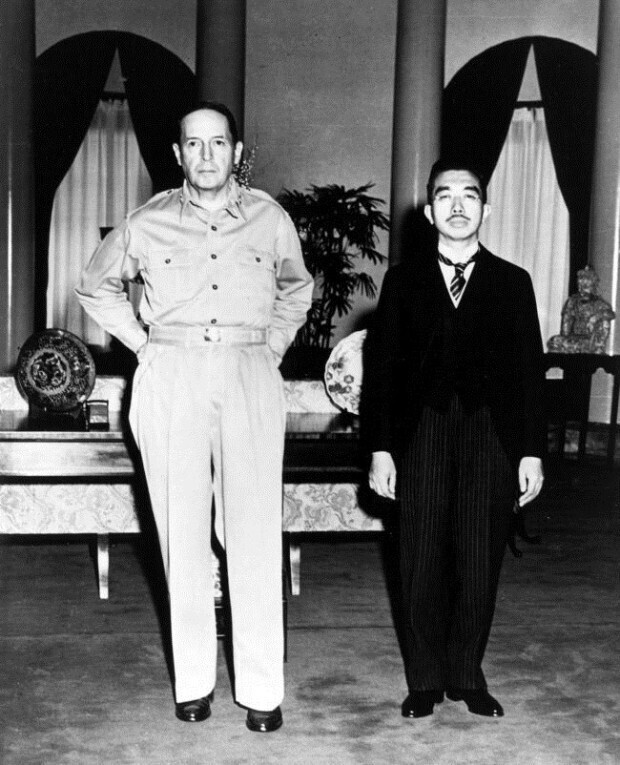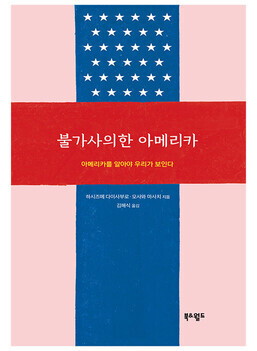hankyoreh
Links to other country sites 다른 나라 사이트 링크
[Book review] Japan’s borderline pathological veneration of America, and lessons for Korea


“Uncanny America: Understanding America to See Ourselves”
by Daisaburo Hashizume & Masachi Osawa, Korean translation by Kim Hae-sik
Book & World, 18,000 won
What does the US represent to us? In this book, that question is posed by two Japanese scholars.
“Uncanny America,” a 2018 compilation of conversations between two sociologists — Daisaburo Hashizume, 76, an emeritus professor at the Tokyo Institute of Technology, and Masachi Osawa, 66, a former professor at Kyoto University — answers questions about the world’s biggest power today in a relatively accessible way.
Underlying the dialogue is the critical perception that too many people in Japan today venerate the US without actually understanding it.
“Japanese people take it for granted that America exists,” Hashizume said. “It’s so obvious to them that they can’t imagine a world without America. But if you really think about it, it’s pretty amazing that such a country exists at all. And what’s even more amazing is how Japan has continued implementing policies that are so closely bound to the US for more than seven decades now.”
Hashizume and Osawa point to Protestantism and pragmatism as key concepts for understanding the US.
Given that the US is a country founded on religion, it makes sense that Protestant Christianity would be one of the keys to explaining it. Indeed, it might not exist at all had it not been for Protestants fleeing religious persecution. Meanwhile, the philosophy of pragmatism is representative of Americans’ way of living.
The basis for connecting Protestantism and pragmatism can be found in the country’s religious diversity. Various denominations believe in their own version of religious truth. But the people belonging to them are descended from those who traveled to the US in search of freedom to practice their own faith.
This means that the only way to respect everyone’s religious freedom is to set aside the idea that any one denomination’s truth is transcendent. Instead, communication in real life focuses more on pragmatic values.
The result is a country where matters of “truth” are left up to personal faith, while a pragmatic attitude is adopted in matters of living.
After taking this approach to exploring Americans’ psychological world, the two scholars turn their attention to the US version of capitalism, which has flourished amid pragmatic beliefs and the Protestant doctrine of predestination. They then ask the questions of why racial discrimination has not gone away in the US and why socialism has failed to gain any wide purchase.
By the conclusion, they are turning their critical gaze on Japanese society and asking why the Japanese people have become so deeply bound to their country’s relationship with the US.
According to Hashizume and Osawa, this is because Japanese people during the post-World War II occupation viewed the US within the pre-modern frame of the samurai/commoner relationship. It was a perspective that positioned the US as “masters” and themselves as subordinates.
The two scholars take on an impassioned tone as they write about the Japanese people’s ignorance of the US. “The problem,” they suggest, “is that Japan does not understand the essence of America.”
Their message cuts to the quick: Japan may be special in its high level of psychological dependence on the US, but it is also exceptionally lacking in understanding of the US. In other words, the Japanese people hang onto fantasies of the US without knowing its reality.
“Understanding America,” the scholars write, “is the first step toward overcoming a level of dependence on America that borders on the perverse.”
Once it sheds this pathological obsession and dependence on the US, the two scholars say, “Japan will find itself, and experience a renewed realization of what it can do about America and the world.”
But this infantile overreliance on the US isn’t unique to Japan. That’s why the book has been translated into Korean.
By Ko Myoung-sub, senior staff writer
Please direct questions or comments to [english@hani.co.kr]

Editorial・opinion
![[Editorial] Perilous stakes of Trump’s rhetoric around US troop pullout from Korea [Editorial] Perilous stakes of Trump’s rhetoric around US troop pullout from Korea](https://flexible.img.hani.co.kr/flexible/normal/500/300/imgdb/original/2024/0509/221715238827911.jpg) [Editorial] Perilous stakes of Trump’s rhetoric around US troop pullout from Korea
[Editorial] Perilous stakes of Trump’s rhetoric around US troop pullout from Korea![[Guest essay] Preventing Korean Peninsula from becoming front line of new cold war [Guest essay] Preventing Korean Peninsula from becoming front line of new cold war](https://flexible.img.hani.co.kr/flexible/normal/500/300/imgdb/original/2024/0507/7217150679227807.jpg) [Guest essay] Preventing Korean Peninsula from becoming front line of new cold war
[Guest essay] Preventing Korean Peninsula from becoming front line of new cold war- [Column] The state is back — but is it in business?
- [Column] Life on our Trisolaris
- [Editorial] Penalties for airing allegations against Korea’s first lady endanger free press
- [Editorial] Yoon must halt procurement of SM-3 interceptor missiles
- [Guest essay] Maybe Korea’s rapid population decline is an opportunity, not a crisis
- [Column] Can Yoon steer diplomacy with Russia, China back on track?
- [Column] Season 2 of special prosecutor probe may be coming to Korea soon
- [Column] Park Geun-hye déjà vu in Yoon Suk-yeol
Most viewed articles
- 1Korea likely to shave off 1 trillion won from Indonesia’s KF-21 contribution price tag
- 2Nuclear South Korea? The hidden implication of hints at US troop withdrawal
- 3With Naver’s inside director at Line gone, buyout negotiations appear to be well underway
- 4In Yoon’s Korea, a government ‘of, by and for prosecutors,’ says civic group
- 5[Editorial] Perilous stakes of Trump’s rhetoric around US troop pullout from Korea
- 6‘Free Palestine!’: Anti-war protest wave comes to Korean campuses
- 7How many more children like Hind Rajab must die by Israel’s hand?
- 8Overseeing ‘super-large’ rocket drill, Kim Jong-un calls for bolstered war deterrence
- 9[Photo] ‘End the genocide in Gaza’: Students in Korea join global anti-war protest wave
- 10[Guest essay] Maybe Korea’s rapid population decline is an opportunity, not a crisis